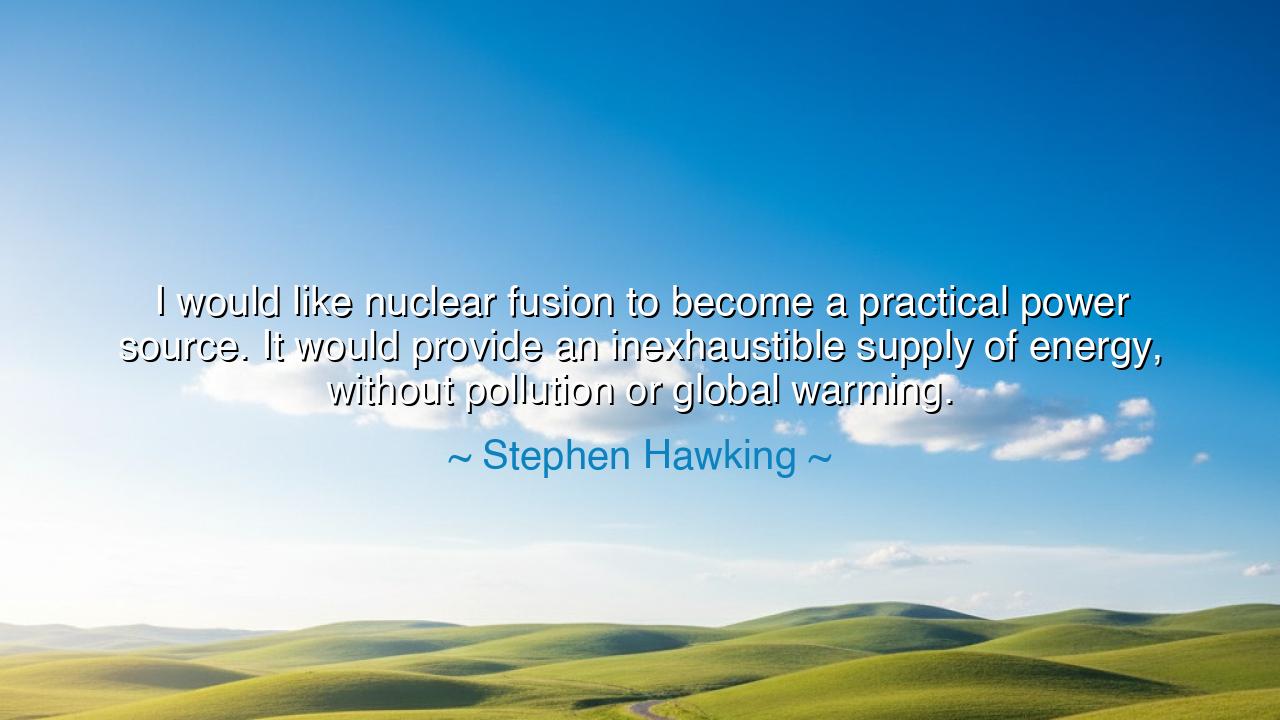
I would like nuclear fusion to become a practical power source.
I would like nuclear fusion to become a practical power source. It would provide an inexhaustible supply of energy, without pollution or global warming.






Hearken, O children of the future, to the vision of Stephen Hawking, who speaks of the promise of nuclear fusion as a power source for the generations yet unborn. He declares his desire that this force, harnessed with wisdom, may become practical, offering an inexhaustible supply of energy that does not sully the earth nor imperil the climate with pollution or global warming. Herein lies a teaching for the ages: human ingenuity, guided by foresight and moral responsibility, holds the power to transform the world for the betterment of all.
The origin of this reflection lies in Hawking’s life as a physicist and visionary thinker, one who contemplated not only the vastness of the cosmos but also the fragility of the Earth. In his study of the fundamental forces that govern matter and energy, he recognized the potential of fusion, the same process that powers the sun, to provide humanity with clean and limitless energy. His insight was grounded in both scientific rigor and ethical responsibility, merging knowledge with the desire to safeguard life and the environment.
The meaning of this aphorism is profound: the pursuit of knowledge and power must be guided by foresight and moral clarity. Nuclear fusion represents not only a scientific triumph but a solution to the crises that imperil our planet. Hawking reminds us that human endeavor, when aligned with wisdom, can unlock resources that sustain life, preserve the natural world, and elevate civilization toward enduring prosperity.
History provides luminous testimony to this principle. Consider Marie Curie, who unlocked the secrets of radioactivity. Her discoveries transformed medicine, energy, and science, yet she approached her work with care and awareness of its profound consequences. Like Hawking, she exemplifies the power of knowledge guided by responsibility, showing that discovery must be accompanied by moral discernment to benefit the generations yet to come.
Moreover, this teaching extends beyond physics to all domains of human labor and thought. The artisan, the scholar, and the leader alike must recognize that the fruits of their knowledge and innovation carry both promise and responsibility. Hawking’s vision for fusion energy reminds us that true progress lies not merely in technical mastery, but in its application for the welfare of all life, in harmony with the earth and the heavens.
O generations yet unborn, take this counsel into your hearts: pursue knowledge with courage, explore the forces of the universe with wisdom, and strive to harness the power of creation for the good of all. Let nuclear fusion be a symbol of human ingenuity guided by foresight, offering inexhaustible energy, protecting the planet, and lighting the path of civilization toward a future radiant with hope, understanding, and enduring harmony.






HKHoa Khanh
Hawking’s enthusiasm for nuclear fusion as a solution to global energy problems is contagious, but I wonder: does this idea overlook the potential unintended consequences of a new energy source? While the lack of pollution and global warming sounds ideal, what about the geopolitical implications or the social impact of such a revolutionary shift in energy? Could there be unforeseen side effects we aren’t considering in the excitement of a cleaner future?
BAngo binh an
Nuclear fusion as a power source sounds like the perfect solution to the world’s energy needs and environmental concerns. However, I’m curious about the challenges that would come with implementing it on a global scale. Would it be accessible to all countries, or would it create new divisions between the developed and developing worlds? Could the infrastructure required for fusion energy make it even more costly and complex than current energy methods?
LDNguyen Tran Linh Dan
I agree with Hawking’s vision of nuclear fusion as the future of energy, especially in terms of combating climate change. But it makes me wonder how much research has actually progressed in making fusion energy a reliable source. Why have we made so little progress despite the promise of limitless energy? Could it be the complexity of the technology, or are there other unforeseen obstacles in the way?
UGUser Google
This quote strikes me as a powerful call for innovation. If we could unlock nuclear fusion’s potential, it would be a game-changer. But, it makes me think: what could go wrong? Given the complexity of nuclear energy, are there risks that could outweigh the benefits of a practically infinite power source? Should we be worried about the safety implications or focus on the vast benefits it could bring to the environment and global energy needs?
MTPhung Minh Thuy
Stephen Hawking’s vision for nuclear fusion as a clean energy source is inspiring, but it makes me question the feasibility. How long will it take for us to harness it in a practical way, and what role will innovation play in bridging that gap? Can we realistically expect fusion to be the key to solving our energy crisis? The thought of solving energy and pollution issues with one solution is exciting, but is it too optimistic?